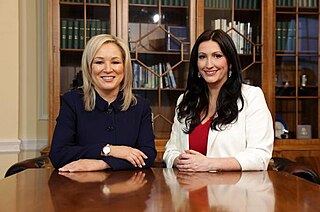
Northern Ireland is a part of the United Kingdom in the north-east of the island of Ireland that is variously described as a country, province or region. Northern Ireland shares an open border to the south and west with the Republic of Ireland. At the 2021 census, its population was 1,903,175, making up around 3% of the UK's population and 27% of the population on the island of Ireland. The Northern Ireland Assembly, established by the Northern Ireland Act 1998, holds responsibility for a range of devolved policy matters, while other areas are reserved for the UK Government. The government of Northern Ireland cooperates with the government of Ireland in several areas under the terms of the Belfast Agreement. The Republic of Ireland also has a consultative role on non-devolved governmental matters through the British–Irish Governmental Conference (BIIG).

The Government of Ireland Act 1920 was an act of the Parliament of the United Kingdom. The Act's long title was "An Act to provide for the better government of Ireland"; it is also known as the Fourth Home Rule Bill or (inaccurately) as the Fourth Home Rule Act and informally known as the Partition Act. The Act was intended to partition Ireland into two self-governing polities: the six north-eastern counties were to form "Northern Ireland", while the larger part of the country was to form "Southern Ireland". Both territories were to remain part of the United Kingdom of Great Britain and Ireland and provision was made for their future reunification through a Council of Ireland. The Act was passed by the British Parliament in November 1920, received royal assent in December and came into force on 3 May 1921.

Northern Ireland is one of the four countries of the United Kingdom, situated in the north-east of the island of Ireland. It was created as a separate legal entity on 3 May 1921, under the Government of Ireland Act 1920. The new autonomous Northern Ireland was formed from six of the nine counties of Ulster: four counties with unionist majorities – Antrim, Armagh, Down, and Derry/Londonderry – and two counties with slight Irish nationalist majorities – Fermanagh and Tyrone – in the 1918 General Election. The remaining three Ulster counties with larger nationalist majorities were not included. In large part unionists, at least in the north-east, supported its creation while nationalists were opposed.

The Northern Ireland Assembly, often referred to by the metonym Stormont, is the devolved legislature of Northern Ireland. It has power to legislate in a wide range of areas that are not explicitly reserved to the Parliament of the United Kingdom, and to appoint the Northern Ireland Executive. It sits at Parliament Buildings at Stormont in Belfast.
In the United Kingdom, the boundary commissions are non-departmental public bodies responsible for determining the boundaries of parliamentary constituencies for elections to the House of Commons. There are four boundary commissions: one each for England, Scotland, Wales and Northern Ireland.
The Northern Ireland Executive is the devolved government of Northern Ireland, an administrative branch of the legislature – the Northern Ireland Assembly. It is answerable to the assembly and was initially established according to the terms of the Northern Ireland Act 1998, which followed the Good Friday Agreement. The executive is referred to in the legislation as the Executive Committee of the assembly and is an example of consociationalist ("power-sharing") government.
Local government in Northern Ireland is divided among 11 single-tier districts known as 'Local Government Districts' and formerly known as district council areas (DCAs). Councils in Northern Ireland do not carry out the same range of functions as those in the rest of the United Kingdom; for example they have no responsibility for education, road-building or housing. Their functions include planning, waste and recycling services, leisure and community services, building control and local economic and cultural development. The collection of rates is handled centrally by the Land and Property Services agency of the Northern Ireland Executive.
The Nineteenth Amendment of the Constitution is an amendment of the Constitution of Ireland which permitted the state to be bound by the British–Irish Agreement and enabled the establishment of shared political institutions between Ireland and Northern Ireland. It also provided a mechanism for a further amendment to the Constitution upon a declaration by the government on the implementation of the Agreement, most notably by changing Articles 2 and 3 from the previous claim over the whole island of Ireland to an aspiration towards creating a united Ireland by peaceful means, "with the consent of a majority of the people, democratically expressed, in both jurisdictions in the island".

United Ireland, also referred to as Irish reunification or a New Ireland, is the proposition that all of the island of Ireland should be a single sovereign state. At present, the island is divided politically: the sovereign state of Ireland has jurisdiction over the majority of Ireland, while Northern Ireland, which lies entirely within the Irish province of Ulster, is part of the United Kingdom. Achieving a united Ireland is a central tenet of Irish nationalism and Republicanism, particularly of both mainstream and dissident republican political and paramilitary organisations. Unionists support Northern Ireland remaining part of the United Kingdom and oppose Irish unification.

The Partition of Ireland was the process by which the Government of the United Kingdom of Great Britain and Ireland (UK) divided Ireland into two self-governing polities: Northern Ireland and Southern Ireland. It was enacted on 3 May 1921 under the Government of Ireland Act 1920. The Act intended both territories to remain within the United Kingdom and contained provisions for their eventual reunification. The smaller Northern Ireland was duly created with a devolved government and remained part of the UK. The larger Southern Ireland was not recognised by most of its citizens, who instead recognised the self-declared 32-county Irish Republic. On 6 December 1922, Ireland was partitioned. At that time, the territory of Southern Ireland left the UK and became the Irish Free State, now known as the Republic of Ireland.
Borough status is granted by royal charter to local government districts in England, Wales and Northern Ireland. The status is purely honorary, and does not give any additional powers to the council or inhabitants of the district. In Scotland, similarly chartered communities were known as royal burghs, although the status is no longer granted.

The fire services in the United Kingdom operate under separate legislative and administrative arrangements in England and Wales, Northern Ireland, and Scotland.

The Northern Ireland Assembly was a legislative assembly set up by the Government of the United Kingdom on 3 May 1973 to restore devolved government to Northern Ireland with the power-sharing Northern Ireland Executive made up of unionists and nationalists. It was dissolved in March 1975.
The Parliament of Northern Ireland was the home rule legislature created under the Government of Ireland Act 1920, which existed from 7 June 1921 to 30 March 1972, when it was suspended. It was subsequently abolished under the Northern Ireland Constitution Act 1973.
The Brookeborough ministry was the third Government or Executive Committee of the Privy Council of Northern Ireland. It was led by Basil Brooke, who was Prime Minister from 1 May 1943 to 26 March 1963.
The Parliament of Northern Ireland was the home rule legislature created under the Government of Ireland Act 1920, which existed from 7 June 1921 to 30 March 1972, when it was suspended. It was subsequently abolished under the Northern Ireland Constitution Act 1973.

The First Minister and deputy First Minister of Northern Ireland are the joint heads of government of Northern Ireland, leading the Northern Ireland Executive and with overall responsibility for the running of the Executive Office. Despite the titles of the two offices, the two positions have the same governmental power, resulting in a duumvirate; the deputy First Minister, customarily spelled with a lowercase d, is not subordinate to the First Minister. Created under the terms of the 1998 Good Friday Agreement, both were initially nominated and appointed by members of the Northern Ireland Assembly on a joint ticket by a cross-community vote, under consociational principles. That process was changed following the 2006 St Andrews Agreement, such that the First Minister now is nominated by the largest party overall, and the deputy First Minister is nominated by the largest party from the next largest community block.

Since 1922, the United Kingdom has been made up of four countries: England, Scotland, Wales and Northern Ireland. The UK Prime Minister's website has used the phrase "countries within a country" to describe the United Kingdom.
The Parliament of Northern Ireland was the home rule legislature created under the Government of Ireland Act 1920, which existed from 7 June 1921 to 30 March 1972, when it was suspended. It was subsequently abolished under the Northern Ireland Constitution Act 1973.

The Good Friday Agreement (GFA) or Belfast Agreement is a pair of agreements signed on 10 April 1998 that ended most of the violence of the Troubles, an ethno-nationalist conflict in Northern Ireland since the late 1960s. It was a major development in the Northern Ireland peace process of the 1990s. It is made up of the Multi-Party Agreement between most of Northern Ireland's political parties, and the British–Irish Agreement between the British and Irish governments. Northern Ireland's present devolved system of government is based on the agreement.










